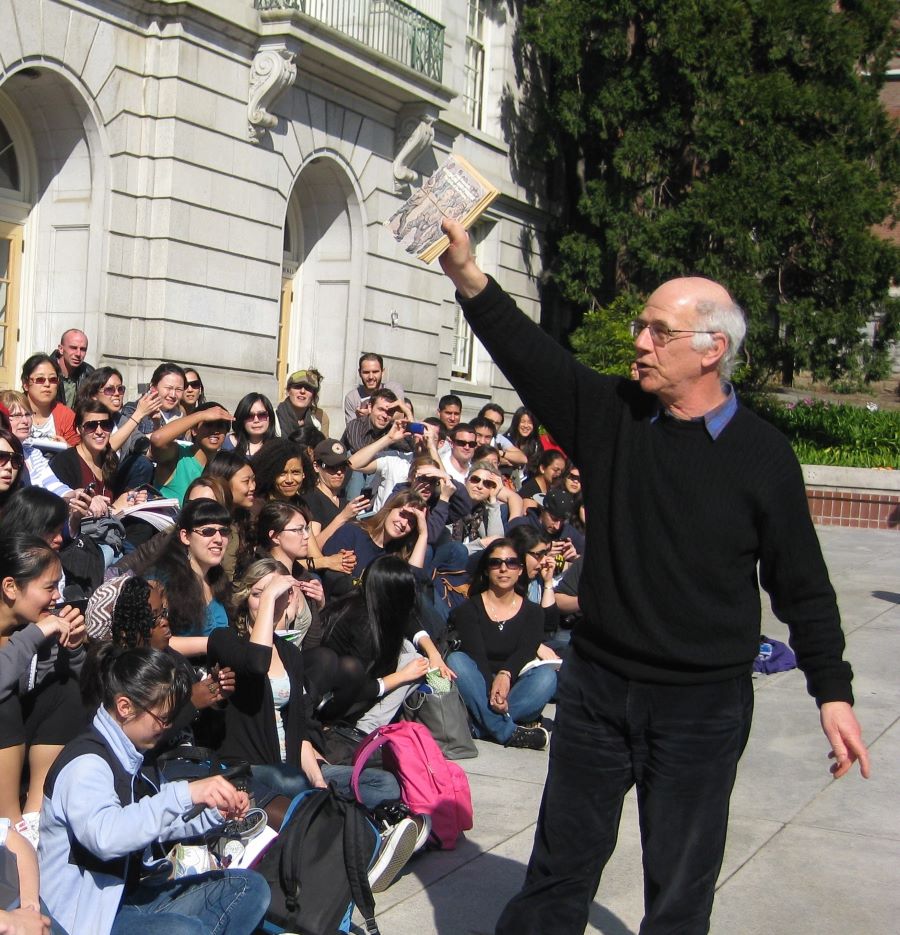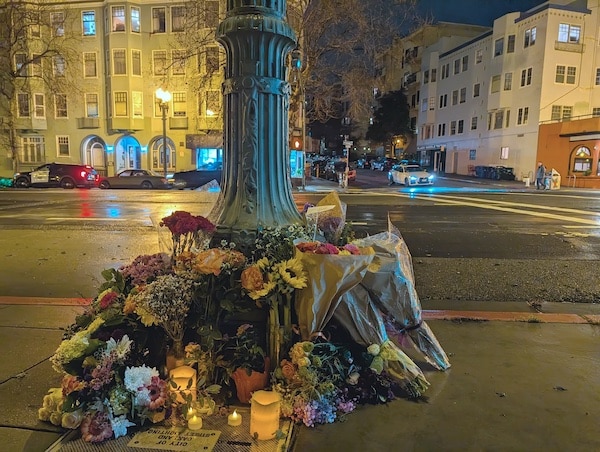For the last 30 years, one of the world’s most influential Marxist sociologists lived in a modest corner apartment building a block or so from Oakland’s Lake Merritt. Michael Burawoy, a British scholar known for his work bringing, as he put it, “visions from the shop floor to academia,” was a beloved community member who loved Oakland back.
On Monday night, Burawoy was hit and killed by a driver at the intersection of Grand Avenue and Park View Terrace while using the crosswalk.
Oakland police told The Oaklandside that paramedics responded to the scene at 7:15 p.m. and took Burawoy to a local hospital, where he died. The driver, who was moving westbound on Grand toward Broadway, fled the scene and has not been identified.
Burawoy, who retired from the UC Berkeley sociology department in 2023, was 77.
News of his death moved swiftly through the sociology community. Colleagues mourned the silencing of an important voice against injustice.
“He left us at a time we most needed his leadership, his energy, his tireless work to understand our world, his example as an extraordinary teacher, his faith in a relevant public sociology, his openness to a global dialogue, his energy against injustice,” said Geoffrey Pleyers, the Belgium-based president of the International Sociological Association, on Bluesky. Burawoy was a former leader of the group between 2010 and 2014.
Ana-Cristina Santos, the chair of Sociology at the University of Coimbra in central Portugal, said on Bluesky that Burawoy was one of “the greatest.” Without him, she wrote,
we wouldn’t have the public and engaged sociology I believe in.
UC Berkeley Social Sciences Dean Raka Ray released a statement distributed by the university saying that she was “reeling” from the news of her mentor’s death and that it was a “tremendous loss” to “sociologists worldwide, from England to South Africa, and from India to Brazil.”
“Michael dedicated 47 years of his life to Berkeley, contributing immeasurably to the discipline, transforming the fields of labor, ethnography and theory,” Ray said in the statement.
His greatest legacy, though, went far beyond the many books and articles he published or prestigious awards he received–it was in the people whose lives he changed. He was an extraordinary teacher who mentored and inspired thousands of students, changing their lives with his fierce intellect and kindness.

Burawoy was a fixture at protests on campus, according to his former students. (Photo: Ana Villareal/UC Berkeley)
The university is planning a memorial for Burawoy. In 2023, an endowment in his honor was created in the sociology department so that young researchers could pursue the subject with the same vigor and purpose.
Burawoy, who studied under the influential sociologist William Julius Wilson, is best known for his seminal 1979 book, Manufacturing Consent: Changes in the Labor Process under Monopoly Capitalism, based on his experience working in a Chicago machine shop. In it, he argued that workers unknowingly participated in their own exploitation by accepting management’s framing of their work as competition, among other types of manipulation. It was part of his careerlong effort to “to recover visions from below” that could open up possibilities for the future.
In the last 20 years, Burawoy began advocating for what he called a “public sociology” as distinct from a “policy sociology” that addressed itself principally to policymakers. Public sociology sought to bring the discipline into conversation with wider audiences.
Margaret Abraham, a sociologist at Hofstra University, said in an article for Global Dialogue, the international sociology magazine, that Burawoy’s public sociology evangelism was at its core “humanistic.” It wanted to build a “better world where there will be less socially produced suffering.”
“This in turn entails a sociology that grapples with the real-world problems of social exclusion, vast inequalities of wealth and opportunity, commodification, and a market-centric world. Sociology’s major mission is to proactively join in the battle to protect society from the ravages wreaked by market fundamentalism,” she wrote.
More recently, Burawoy trained his lens on halting the “barbaric cruelty” in Gaza, saying that sociology should also play a role.
“Sociology teaches us that immediate and permanent ceasefire if not sufficient is certainly necessary not just for the protection of Palestinian lives, but for the savior of Israel, and not just for Israel but for Jews everywhere who face ever greater antisemitism, precisely because of the barbaric cruelty conducted in their name. The megalomania of settler colonialism can be halted either by mutual destruction or external intervention,” Burawoy wrote on the Sociologists for Palestine site.
Local safe streets advocates, who have pressured politicians to improve Oakland’s historically underfunded infrastructure network of streets in recent years, spoke out about the collision.
Carter Lavin, a local transit advocate who’s been leading the effort to add protected bike lanes and shorter crosswalks on Grand, told us that Burawoy’s death was especially heartbreaking because it was preventable. He noted that parents who use that crosswalk to take their children to the Fairyland theme park have been calling for years to improve the crossing.
“The city is considering proposed safety redesigns for the corridor, including fixing this intersection to shorten the distance people have to cross, but plans don’t keep us safe,” said Lavin said, a resident of the Adams Point neighborhood that Burawoy lived in.
Every day that goes by without those safety improvements is another day community members continue to be exposed to these dangerous conditions.
The Oakland Department of Transportation has been studying the addition of a cycle track on Grand Avenue as well, with staffers running surveys in the last few years, finding that the average car travels about 8 miles above the speed limit.
Local advocacy organizations, including Walk Oakland, Bike Oakland, Traffic Violence Rapid Response, Bike East Bay, and Transport are petitioning the city to fast-track those changes to Grand. It’s one of a series of actions taken around Lake Merritt to make it safer for pedestrians and cyclists. Recently, the city greenlit improvements on the other side of the lake after a young girl was killed in a collision.

